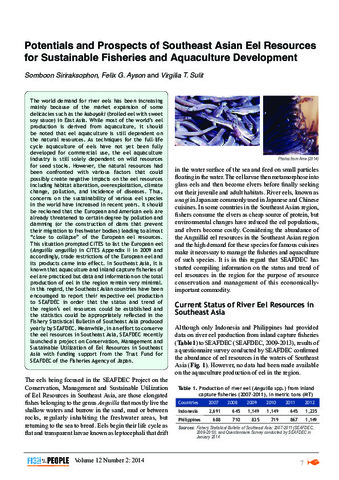Fishery resource enhancement: An overview of the current situation and issues in the southeast Asian region
- Global styles
- MLA
- Vancouver
- Elsevier - Harvard
- APA
- Help
Share
抄録
The total global production from capture fisheries has plateaued since the mid 90s. This stagnation in production or reduced productivity of the world’s coastal and marine wild fisheries is caused by overfishing and degradation of habitats through coastal development and destructive fishing methods. Reports have shown that if the current fishing trends continue, all of the commercial fisheries will have collapsed by 2050. To boost production, scientists, fisheries managers, government agencies, and NGOs have been looking at ways of enhancing fish stocks. Replenishing depleted stocks may be done by regulating fishing effort, restoring degraded nursery and spawning habitats or through resource enhancement. Resource enhancement using individuals reared in aquaculture facilities or seed stocks abundant in the wild is becoming a popular method of supplementing depleted stocks. It is one of the many strategies that could help address the decreasing fisheries production in the wild. A brief history of resource enhancement, the aquatic species released in the different countries in the region, the reasons for releasing stocks, and the issues involved, are discussed briefly in this paper. Among the main reasons for resource enhancement are to increase production or enhance stocks and increase food supply and/or family income. Other reasons include protection of endemic and maintenance of endangered species, rehabilitation of degraded natural habitats and for recreation fisheries, among others. Age or size of seeds, seed quality, genetics, governance, economics, biodiversity conservation, politics, and the introduction of exotics are among the resource enhancement issues identified in the region.
Suggested Citation
Lebata-Ramos, M. J. H., & Doyola-Solis, E. F. (2016). Fishery resource enhancement: An overview of the current situation and issues in the southeast Asian region. In K. Hajime, T. Iwata, Y. Theparoonrat, N. Manajit, & V. T. Sulit (Eds.), Consolidating the Strategies for Fishery Resources Enhancement in Southeast Asia. Proceedings of the Symposium on Strategy for Fisheries Resources Enhancement in the Southeast Asian Region, Pattaya, Thailand, 27-30 July 2015 (pp. 124-128). Samutprakan, Thailand: Training Department, Southeast Asian Fisheries Development Center.
Type
Conference paperCollections
- Conference Proceedings [298]
Related items
Showing items related by title, author, creator and subject.
-
Fisheries, aquaculture and stock enhancement in Lao PDR
Choudara, Hanh (Aquaculture Department, Southeast Asian Fisheries Development Center, 2006)Fisheries development in Lao PDR is confined to inland fisheries development and sustainable freshwater aquaculture including culture-enhanced capture fisheries and fishery-enhanced aquaculture. Given the potential of ... -
Potentials and prospects of Southeast Asian eel resources for sustainable fisheries and aquaculture development
Siriraksophon, Somboon; Ayson, Felix G.; Sulit, Virgilia T. (Secretariat, Southeast Asian Fisheries Development Center, 2014)The world demand for river eels has been increasing mainly because of the market expansion of some delicacies such as the kabayaki (broiled eel with sweet soy sauce) in East Asia. While most of the world’s eel production ... -
Organization and development of stock enhancement in Japan
Sugaya, Takuma (Aquaculture Department, Southeast Asian Fisheries Development Center, 2006)In the 1960s, the Japanese economy was starting to industrialize. The rapid increase in business investment in new factories and equipment stimulated a yearly economic growth rate of approximately 12% (METI 1970). However, ...







